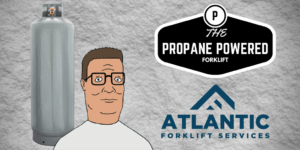 Propane can not only grill up a tasty burger on a long Summer afternoon, it can also power your forklift. No wonder Hank Hill loved propane so much. Now, there are some differences between the propane in your grill, and your propane-powered forklift.
Propane can not only grill up a tasty burger on a long Summer afternoon, it can also power your forklift. No wonder Hank Hill loved propane so much. Now, there are some differences between the propane in your grill, and your propane-powered forklift.
A propane-powered forklift uses Liquid Propane (LP.) It’s actually a mix of propane and butane and is used mainly to power vehicles.
If you choose a LP powered forklift, there are some things you will need to know up front.
LP is a cleaner fuel, causing less wear and tear on your engine and less carbon monoxide exhaust in your workplace. It’s also (you’re going to like this) cheaper to maintain than a regular gas forklift.
LP fuel is stored in a tank, not unlike the tank that fuels your propane grill. You change out the forklift tank when it’s empty just like your grill. Tanks come in aluminum and steel, and as you might guess the aluminum tanks are lighter and a little easier to swap out.
As anyone who has ever had a propane tank run empty in the middle of a cook will tell you, having extra tanks handy is essential. For your forklift, generally, you can get a little over six hours out of a 33-pound LP tank. Having extra tanks can prevent you from having to shut down for the day when a tank runs “dry.” How many tanks your shop may need will really depend on how often you use your forklift, but since tanks don’t have a gauge to let you know just when they’re going to run empty, having at least one extra tank at all times is a great standard practice.
Safe storage of your extra tanks is critical. LP is explosive. The tanks should be stored in an area without machinery that is likely to spark. LP storage closets are available if you work in a machine shop.
Questions? Our staff can help you decide if a propane-powered forklift is right for you.
